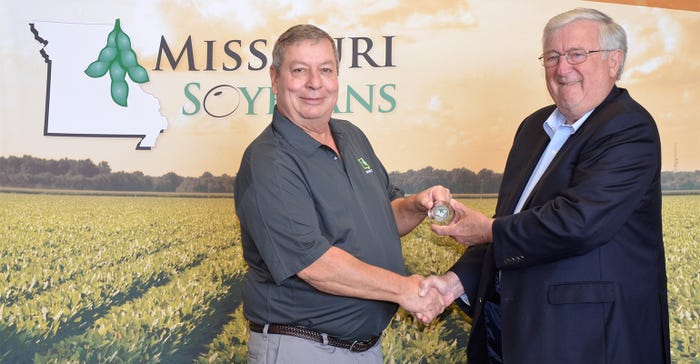
The Missouri Soybean Merchandising Council entered into an agreement with Iowa-based Schillinger Genetics to bring non-GMO, high-oleic soybean technology to growers.
MSMC Chairman John Kelley and Schillinger Genetics founder John Schillinger signed the agreement for the Bay Farm Research Facility outside of Columbia. The location exemplified what can happen when industry, academia and growers work together, according to Kelley. "The Missouri Soybean Association provides the facility; the Missouri Soybean Merchandising Council overseas the research that is in partnership with University of Missouri and USDA," he says. "It results in breeding soybeans that will bring value to farmers."
In production
The license is not only to commercialize high-oleic soybean technology traits, but also to breed soybean varieties by combining high-oleic with low-linoleic soybean traits. Schilling says he is proud of two varieties in mid-groups 3 and 4. "They are in seed production in 2017," he says. "We will release them in 2018 commercially."
Growers wanting to enter this market may find limited availability depending on weather. Schilling anticipates between 30,000 and 35,000 units for growers next year. They will be sold under the name eMerge.
Test plots are in place for this growing season throughout the Midwest and in southeast Missouri. Trial results will be available to Missouri farmers after harvest.
"This is a big deal for soybean farmers of the state," says Gary Wheeler, Missouri Soybean Association executive director. "Growers in the state continue to tell us that research is where they want their investment. Research attributes to half of the checkoff revenue."
Making high-oleic
Grover Shannon, a soybean breeding specialist at the MU Fisher Delta Research Center, was working with breeding high-oleic traits into soybeans. He needed germplasm. Enter Kristen Bilyeu, a USDA molecular biologist. Bilyeu had a rather large collection from Asia and began to look more closely at a naturally occurring gene in soybeans.
What she found was a variation in two different soybean lines. "Independently, the genes could not make a high-oleic acid," she says, "but when paired together, they could." Then Shannon started breading for oil and yield.
In 2015, U.S. Patent No. 9,035,129 was established based on the method Shannon and Bilyeu used to produce soybeans with high-oleic acid content through natural breeding. That patent number, along with 9,198,365, will be on all packages of commercial seed developed through the license. Packages will also include the MSMC logo.
More to come
Schillinger says that second- and third-year tests of high-oleic experimental lines are being conducted in 2017 from North Dakota to Arkansas. "High-oleic varieties from SGI research program will enter the U.S. market in 2019 for several maturities," he adds.
Total, the company has 141 lines from Group 0 to Group 4. "We believe strongly in the potential of high-oleic soybean oil," Schillinger says. "Our pipeline includes highly promising varieties, and this partnership stands to expand that work."
For more on what the work of MSMC, USDA, MU and Schillinger Genetics click through the photo gallery.
About the Author(s)
You May Also Like






